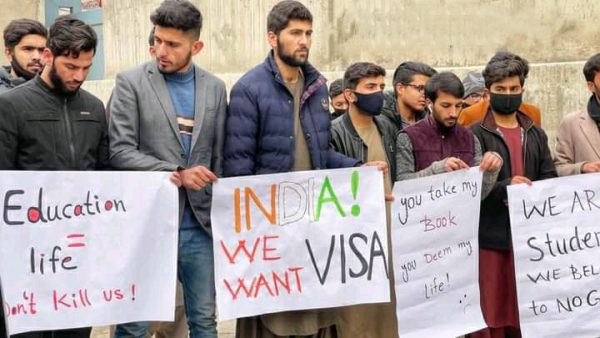
It is a little over a year since the Taliban captured power in Afghanistan. Afghans around the world have been protesting against the international community’s inaction to resolve the many problems they face since the Taliban came to power.
Soon after the Taliban captured Kabul, India shut down its embassy in the Afghan capital, suspended flights between New Delhi and Kabul, and halted bank payments to the Afghan government. While it did reopen the Indian embassy in Kabul, only a “technical team” of officials was sent there in June 2022.
For Afghans who were studying in India and had made India their home away from home, life had become difficult in recent years. During the COVID-19 pandemic and the related lockdowns, Indian universities held classes online. Afghan students studying here flew back to their home country.
With Indian universities resuming on-campus classes, Afghan students enrolled here are facing a plethora of problems. After the regime change in Kabul in August 2021, many students have not been able to return back to India.
Twenty-six-year-old Deedar Saboor is from Afghanistan’s Panjshir province and has spent over $4,000 to pursue a Master’s degree at a private university in the Indian capital, New Delhi. But since the Taliban came to power, his dream of studying in India has been clouded with problems surrounding the regime change in his country. Visas of many students like Saboor stand revoked because the Indian government has not yet recognized the Taliban as a legitimate government.
Meena Nezami was studying at the prestigious Delhi University. But without a student visa to go back to India, she has been unable to complete her Master’s degree. She feels her education is hanging incomplete halfway.
“This time when the Taliban regime took over, the first thing they did was to close women’s schools and colleges in the country. Many girls turned to neighboring countries for education and India was one of them. It was affordable and good quality education,” Nezami says. But without a visa to go to India, they are in limbo.
Despite knowing that thousands of Afghan students are dependent on its universities, India has revoked student visas. However, other countries like Turkey, the U.S., and several European countries have accepted Afghan students after the regime change. As India gives Afghans the cold shoulder, Pakistan has offered 4,500 fully-funded scholarships to Afghan students in addition to already existing ones.
In addition to repression at home, drained finances, and visa woes, Afghan students face the apathy of Indian universities. Although Afghan students have paid their fees, students’ cells at various Indian universities have cut contact with their Afghan students. These students claim that authorities in Indian universities often accuse them of being potential drug peddlers and terrorists.
Piroz Amin, 23, an Afghan student who spent four years in Pune pursuing a Master’s degree, alleges that his university went incommunicado after March 2022. He is in his last semester but cannot complete his degree until India begins issuing visas to Afghan students again, he says. The decision to halt visas to Afghans is hampering people-to-people contact and is robbing students of their prospects.
Students like Meena, Deedar, and Piroz say that the universities have all their personal details, from addresses to biometrics, and hence it is these universities that should request the Indian government to permit their arrival. Trapped under the Taliban and locked out of India, many students who have won scholarships given by the Indian Council for Cultural Relations are also losing hope and opportunities.
After the Taliban came to power, attacks targeting Hindus and Sikhs deepened the vulnerability of these communities to violence. The Indian government extended them held by issuing them electronic visas (e-visas). But for Afghan students, there seems to be no sympathy.
According to data provided by the Afghan Embassy in New Delhi, there are an estimated 13,000 Afghan students currently enrolled in Indian universities. Nearly 2,000 of them returned to Afghanistan during the pandemic lockdowns. They have been shut out from returning to India.
Then there are the Afghans who are in India. Some wish to go back home, but the ban holds them back.
A lecturer at the University of Kabul, Azad Khan Niaz has completed his Master’s degree and is currently enrolled for his Ph.D. in Hyderabad. Niaz says that governments should keep students out of politics. “It not only affects our studies but also affects the overall picture of relations between two countries.
Niaz points out that Afghans always used to prefix “India” with the word “friend.” That friendship is not evident anymore, he says.
Students like Khan Mohammad Babai have been trying to reach out to the Indian technical team in Kabul. “We have called, emailed and even personally met these officials but there is no response from their side,” he laments.
Students also met the Taliban’s interim Foreign Minister Amir Khan Muttaqi on July 4 to discuss the issue. In this meeting, Muttaqi said that the Taliban government will request India to grant visas to Afghan students enrolled in Indian educational institutions so that they would be able to return to resume their courses.
Nasir Ahmadi, a Ph.D. student at a university in northeastern India’s Meghalaya state, is disappointed at the way India has forgotten the Afghan students, who contribute to the Indian economy when they arrive here to study.
“Our education is being compromised because of politics,” said Ahmadi, pointing out that India had become a favorite destination for Afghans to work and study. With the visa ban, many futures are at stake.
Afghan Students Are Unable to Resume Studies in Indian Universities
Source: Frappler

0 Comments